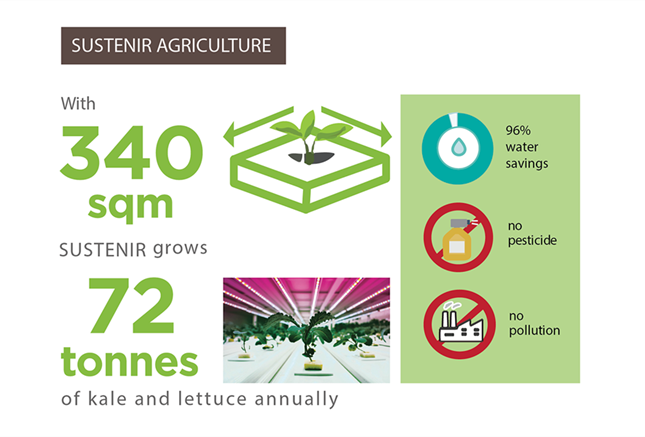Technology is a key enabler for farm transformation. Next-generation farmers’ operations no longer need to be constrained by space, climate, and manual labour. Innovation, engineering, and design will revolutionise food production and strengthen our food security.
Agriculture in Singapore is beginning to transform and shape up to be a modern and creative discipline. We can see that in the successful bidders for the first tranche of farmland sales this year, who will be employing automation, data analytics, robotics, vertical farming and soilless vegetable growing systems to intensify production.
While there are progressive enterprises that operate out of farmlands, some agricultural game-changers are also taking root in unconventional grounds. These next-generation farmers have shown that with new technologies, food production can take place anywhere in the city.
Indoor, industrial: Sustenir Agriculture
Located in an industrial building, Sustenir Agriculture grows temperate produce such as Tuscan kale, arugula, cherry tomatoes, and strawberries within a tightly controlled environment. This ensures optimal plant growth, thus halving the time taken for crops to grow, as well as enabling harvests year-round.
In addition to climate control, Sustenir also closely monitors plant growth and materials consumption using a centralised system linked to staff members’ smartphones. Staff are alerted to any disruptions to the growth cycle, and can resolve them remotely to prevent failures.
Urban rooftop: Comcrop
Out of the industrial estate and into the city, Comcrop takes rooftop farming in urban areas to the next level, by further intensifying production vertically. Operating atop the *SCAPE building on Orchard Road, Comcrop uses a 12-tier vertical hydroponic system to increase its production per square metre of space used. Crops are irrigated by an automatic water pump, which could be powered by solar panels in the future to further minimise its environmental impact.
Modular, anywhere: Citizen Farm, Apollo Aquaculture Group, Surbana Jurong
Farming can take place in unexpected and underutilised spaces as well. Citizen Farm piloted a modular farm under the West Coast viaduct for a period of three months in 2017. A variety of vegetables and mushrooms were cultivated on racks fitted by LED lights, inside climate-controlled shipping containers cooled by fans. This system can be placed just about anywhere, from corridors to viaducts.
Besides vegetables, fish can also be grown vertically indoors. Apollo Aquaculture Group (AAG) currently farms fish using three overlaying tiers of aquaculture tanks, water recirculation systems, and automatic underwater sensors. Taking this further, AAG collaborated with Surbana Jurong to conceptualise a modular and scalable farm, in which “floating ponds” can be set up anywhere in an urban environment such as underutilised spaces. The concept features vertically stacked fish raceways that allow production capacity to be scaled up within limited space. The fish farm is designed to be self-sustaining, with a closed-loop ecosystem where water filtration, nutrient production, and harvesting of solar energy take place.
As these bold new-generation farming professionals continue to push the envelope, we will be able to strengthen Singapore’s food security, and possibly export our food and technologies, too.
These companies were among a host of forward agri-technologists showcased in the ‘Growing More with Less’ exhibition (6 September 2017 to 31 October 2017), organised by the Urban Redevelopment Authority in partnership with AVA.




